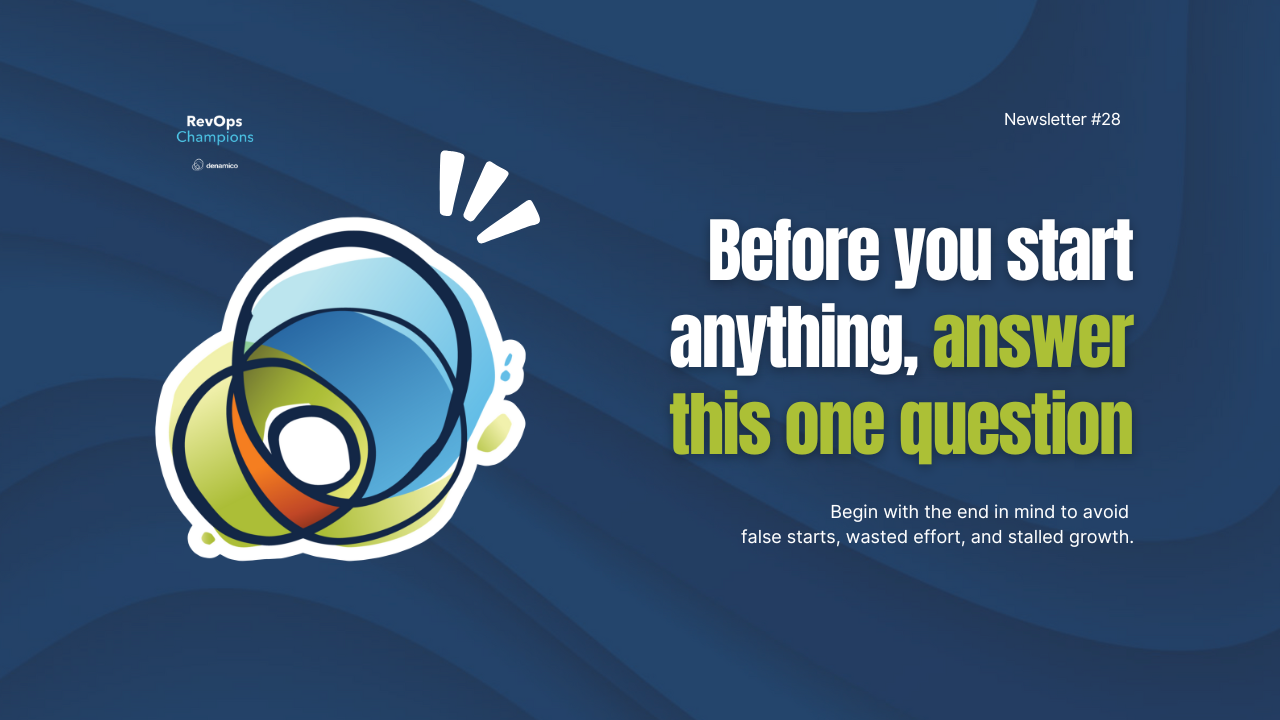RevOps Champions Newsletter #28
I read that book over 20 years ago, but some lessons don’t truly land until life (or business) smacks you in the face with them.
About five years ago, we developed what we thought was a game-changing tool: The RevOps Score, an interactive assessment to help companies measure their maturity across data, technology, people, and processes.
We poured talent and resources into it. Brilliant internal minds shaped the questions, and we invested in a custom-built user interface before tools like Typeform even existed. We were sure it would take off.
It didn’t.
Why? Two reasons:
- Too long: 60 questions, 20 minutes minimum. That’s a lot to ask of a busy leader.
- Too broad: it was cross-functional, so one person often couldn’t answer everything confidently.
The lesson: we hadn’t really begun with the end in mind. If our definition of success had included “completed in 5 minutes or less,” the tool might have gained far more traction, and delivered the value we’d envisioned.
I was reminded of this while listening to our recent RevOps Champions podcast with Nick Powills, CEO of Mainland.
Nick shared a startling stat: 87% of first-time franchisors don’t sell a single franchise in their first two years, often because they underestimate the real cost of gaining momentum. Without a clear picture of ROI and the investment required, it’s easy to underfund a great idea into failure.
Nick’s advice? Know your numbers:
- Understand the lifetime value (LTV) of a franchisee.
- Be willing to invest accordingly - this could be as much as $25K–$50K to acquire a franchisee who’ll return $200K+ in royalties over three years.
Too often, franchisors pitch big returns to sell franchisee units, creating a mismatch between promise and performance. When early results fall short, franchisees hit pause, and growth stalls.
Nick calls the alternative “growing fat before growing tall”: focus on making existing franchisees profitable before adding new locations. Stronger unit economics mean stronger royalty revenue, higher enterprise value, and a healthier brand.
And when defining success up front, Nick feels strongly that a strategic CFO is essential. Embedded in sales and operations, they bring critical visibility into LTV, cost of customer acquisition (CAC), and the capital needed to win.
It’s the same reason I ask prospective clients and team members:
“If we’re talking a year from now and you’re thrilled you chose Denamico, why is that? What’s happened, professionally and personally, that makes you certain you made the right decision?”
When we know the answer to that question, we can align our resources, set realistic expectations, and make success measurable.
I even use this filter in my personal life. Later this month, I’m driving across the country with my daughter to drop her off at college. Three days in the car together could be wonderful - or… not.
So I defined success: arrive safely and on time, have a few meaningful conversations, and create a memory we’ll both remember fondly. That vision gives me a north star for the trip, just like it does in business.
Here’s to defining what success looks like, before you start.
Kristin
 |
Kristin Dennewill
|

